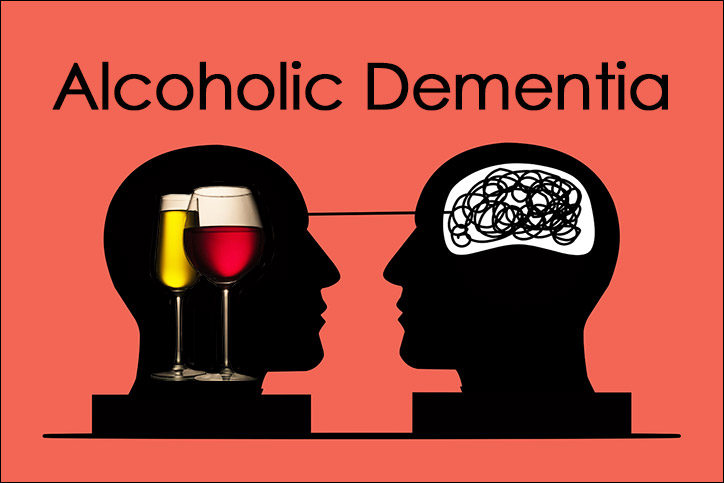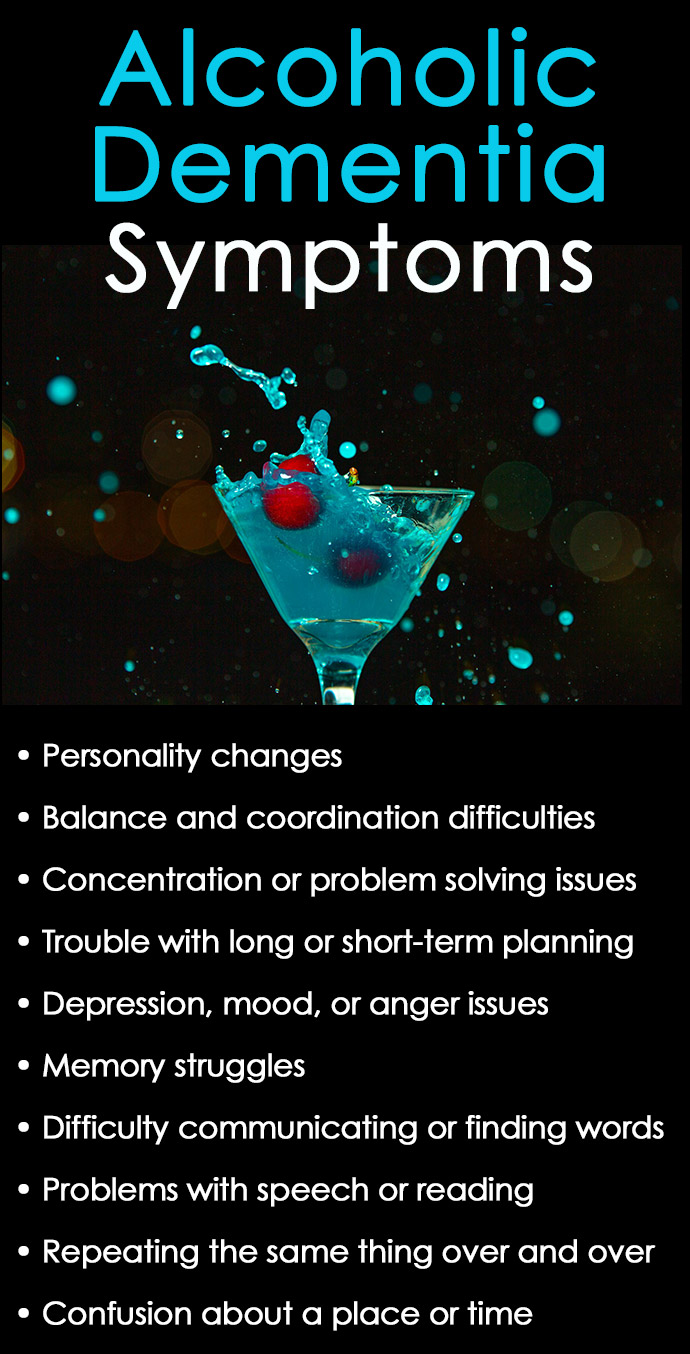Alcoholic dementia is a condition caused by long-term or excessive alcohol use, though the actual diagnosis is known as alcohol-related dementia (ARD).
This condition is a form of alcohol-related brain damage (ARBD) that is directly related to alcohol use and may cause both physical and mental impairments.
It’s common for the long-term negative effects of alcohol to cause issues with cognitive functioning and brain-related conditions like alcoholic dementia.
Understanding the symptoms, causes, and most effective treatments can help those struggling with dementia from alcohol use to seek help as soon as possible before damage to the brain becomes completely irreversible.
What is Alcoholic Dementia?
There are many different types of dementia. For instance, most people are familiar Alzheimer’s disease, which can have overlapping symptoms with alcoholic dementia.
Alcohol-related dementia symptoms are the same, or very similar, to those of other types of dementia, so it can sometimes be difficult for doctors to make an accurate diagnosis.
If a person didn’t drink alcohol much during his or her lifetime, doctors can usually rule out alcoholic dementia as the diagnosis.
With alcoholic dementia, excessive alcohol abuse over a period of years can damage areas of the brain that control memory, learning, motor functions, and other cognitive faculties.
A similar form of alcohol-related dementia is known as “wet brain” or Wenicke-Korsakoff Syndrome (WKS), which are two separate conditions that can occur at the same time.
Wenicke-Korsakoff Syndrome causes people to experience confusion and disorientation, effects short-term memory, makes it hard for a person to learn new things, and can damage his or her ability to move around normally. It is often fatal if left untreated.
Can Alcoholism Cause Dementia?
The short answer to the question, can alcoholism cause dementia is, yes, alcohol can cause dementia.
Alcohol use has a direct impact on brain function, as anyone who has ever had a drink of alcohol knows. After drinking even a little bit, alcohol can temporarily impact a person’s judgment and motor functions.
Over a period of years, excessive alcohol use can permanently damage the brain and lead to alcohol-related dementia.
For many chronic alcoholics, one of the primary causes of dementia-related symptoms comes from a poor diet, specifically a thiamine or vitamin B1 deficiency.
The brain uses thiamine to produce energy from sugar. Without enough thiamine, the brain cannot properly function and may become permanently damaged.
Excessive alcohol use may contribute to other nutritional deficiencies like dehydration and a lack of essential vitamins that can also lead to dementia.
Fortunately, alcoholic dementia can potentially be prevented, and its progression may be slowed or stopped if an individual abstains from drinking alcohol, improves their diet, and takes vitamin supplements like thiamine.
Alcohol Dementia Symptoms
While alcohol-related dementia is more common in older adults, ranging in age from 40 to 50 years old, it can also occur in those who are younger, depending on his or her level and duration of alcohol use.
It can be difficult to know exactly how much alcohol can cause dementia because each person is unique with varying degrees of alcohol use.
Some research suggests that men who drink 35 alcoholic beverages a week and women who consume 28 drinks a week, over a five-year period, have a greater risk of developing alcoholic dementia.
Recognizing the symptoms of dementia from alcohol can be a key to seeking early treatment and slowing or reversing serious brain damage.
Symptoms of alcoholic dementia can include some of the following:
- Unexplained personality changes, especially as it concerns risky behaviors or poor decision making skills
- Balance and coordination difficulties
- Impaired ability to concentrate or solve relatively easy problems
- Trouble with long or short-term planning
- Depression, mood, or anger issues
- Short-term memory problems, such as forgetting what is being talked about while a conversation is happening
- Difficulty communicating, such as having a hard time finding words, or issues understanding speech and reading
- Repeating the same information over and over and being unaware of it
- Confusion about a place or time, as well as getting lost on a familiar path
Memory and cognitive functions are some of the earliest signs of alcoholic dementia and should be treated immediately. In the later stages, a person’s ability to function physically will start to deteriorate.
Is Alcoholic Dementia Reversible?
Seeking early treatment for alcohol-related dementia symptoms is absolutely vital. With treatment, some cognitive impairment is reversible, but only if a person permanently abstains from drinking alcohol.
There is research that shows people who remain completely sober for a year do see some improvement in problem-solving capabilities, working memory, and the ability to concentrate or focus.
Some forms of dementia, like vascular dementia or Alzheimer’s, are progressive diseases that will get worse over time. Luckily, this is not always the case with alcohol dementia, so getting sober and seeking treatment early may stop the symptoms from progressing.
Unfortunately, some cognitive impairments that are brought on by alcoholic dementia, such as the ability to learn new things or short-term memory issues are difficult to reverse even after abstaining from using alcohol.
Alcohol Dementia Treatment
Alcohol-related dementia is diagnosed through a comprehensive assessment that includes a clinical evaluation, physical and cognitive examination, and neurological brain imaging testing.
Anyone diagnosed or struggling with the symptoms of alcoholic dementia should seek professional alcohol treatment at an inpatient substance use addiction facility.
Because alcohol related dementia is such a serious problem, it’s common for people to spend several weeks in hospital to stabilize during the early phases of treatment.
Very often, people who drink excessive amounts of alcohol may experience severe withdrawal symptoms once they stop drinking and will need an alcohol detox program that is supervised by medical professionals.
It’s important that patients going through alcohol withdrawal are monitored in a medical setting because it can be extremely dangerous and uncomfortable.
In some cases, there are medications that can help ease the difficult symptoms of alcohol withdrawal.
For alcoholic dementia treatment, patients may also need thiamine supplements, combined with a well-balanced, healthy diet to restore their strength and cognitive functioning.
After stabilizing the patient and the detox process has been completed, therapeutic treatment approaches, such as one-on-one counseling, as well as group counseling, can be important for addressing the underlying causes of alcohol addiction.
Behavioral approaches like Cognitive Behavioral Therapy (CBT) have shown to help lay a strong foundation for recovery and lasting sobriety.
For anyone struggling with alcoholic dementia, it’s imperative to quit drinking and remain sober for any possibility of recovery to be successful. This will require professional medical help and may take months or years to see improvement for many symptoms, but it is well worth the effort.
Frequently Asked Questions
What is a simple alcoholic dementia definition?
Alcoholic dementia is defined as a form of cognitive impairment from long-term, excessive alcohol consumption that causes neurological damage and mental function decline related to memory, learning, thinking, and physical balance issues.
Is Korsakoff Syndrome a form of alcohol induced dementia?
Yes, Korsakoff Syndrome is considered a form of alcohol-induced dementia caused by a vitamin B-1 (thiamine) deficiency due to excessive alcohol use. It is part of a spectrum of alcohol-related cognitive disorders.
Does drinking alcohol make dementia worse?
Yes, drinking alcohol can worsen dementia symptoms and excessive consumption can accelerate cognitive decline once it has begun. It is recommended that individuals who have been diagnosed with dementia stop drinking alcohol to help reduce further cognitive impairment.
Does alcoholic dementia show up on brain scans?
Yes, alcoholic dementia can show up on brain scans, and technologies such as Magnetic Resonance Imaging (MRI) are useful for providing a diagnosis by revealing brain shrinkage and white matter loss in the prefrontal cortex, cerebellum, and other regions.






